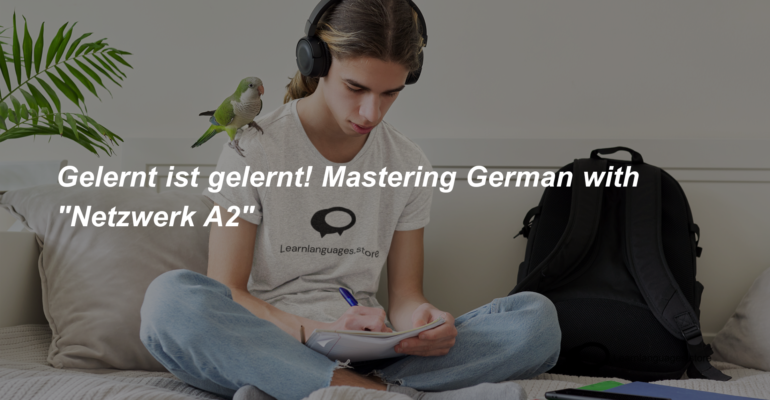Gelernt ist gelernt! Mastering German with “Netzwerk A2”
Gelernt ist gelernt! Mastering German with “Netzwerk A2”
Estimated reading time: 14 minutes
Introduction
Welcome to a journey of linguistic discovery where we delve into the essential aspects of learning German through the theme “Gelernt ist gelernt!” This phrase, which translates to “What’s learned is learned!” captures the spirit of mastering new skills and knowledge, particularly in the context of education and professional life. Drawing from the “Netzwerk A2” textbook, we will explore how to understand and describe learning challenges, give and receive advice, present professional information, and effectively conduct interviews and presentations in German.
As we progress, we will enrich our vocabulary, focusing on topics such as learning, exams, and presentations, while also offering insights into the cultural nuances of studying and working in German-speaking countries. Whether you’re preparing for a presentation or navigating the challenges of learning, this guide will provide you with the tools you need to succeed.

Section 1: Understanding and Describing Learning Problems
Learning a new language is a challenging yet rewarding endeavor. As with any learning process, there can be hurdles along the way. Being able to articulate your learning challenges in German can help you seek the right support and advice.
Vocabulary: Lernen (Learning)
- die Schwierigkeit (Difficulty)
Example: “Ich habe Schwierigkeiten mit der Grammatik.”
Translation: I have difficulties with grammar.
Pronunciation: Ich ha-be shviy-rig-kai-ten mit dehr gra-ma-tik?
(इख़ हाबे श्वीय-रिग-काइ-टन मिट देर ग्रा-मा-टिक?) - das Verständnis (Understanding)
Example: “Mir fehlt das Verständnis für diese Regel.”
Translation: I lack understanding of this rule.
Pronunciation: Meer fehlt das fershtend-niss für dee-zeh reh-gel?
(मीर फेल्ट डास फेर्श्टेंड-निस फ्यूर डी-जे रेगेल?) - der Fortschritt (Progress)
Example: “Ich mache Fortschritte im Vokabular.”
Translation: I am making progress with vocabulary.
Pronunciation: Ich ma-che fort-shritt-eh im vo-ka-bu-lar?
(इख़ माख़े फ़ोर्ट-श्रीटे इम वोका-बु-लार?) - die Motivation (Motivation)
Example: “Ich verliere manchmal die Motivation.”
Translation: I sometimes lose motivation.
Pronunciation: Ich fer-lee-re manch-mal dee mo-ti-va-tsion?
(इख़ फ़ेर-लीरे मांच-माल डी मो-टि-वा-त्सीऑन?) - der Fehler (Mistake)
Example: “Fehler machen gehört zum Lernen dazu.”
Translation: Making mistakes is part of learning.
Pronunciation: Feh-ler ma-chen ge-hört tsum ler-nen da-tsu?
(फे-लर माख़ेन गे-हर्ट त्सुम लर्नेन दा-त्सू?) - die Ablenkung (Distraction)
Example: “Ablenkungen stören meinen Lernprozess.”
Translation: Distractions disrupt my learning process.
Pronunciation: Ab-lenk-ung-en shtö-ren mei-nen lern-pro-tzess?
(आब-लेंकुंग-एन श्टोरन माइनन लर्न-प्रो-त्सेस?) - das Ziel (Goal)
Example: “Mein Ziel ist es, fließend Deutsch zu sprechen.”
Translation: My goal is to speak German fluently.
Pronunciation: Mine tseel ist es, flie-send doytch tsoo shpre-chen?
(माइन त्सील इस्त एस, फ़्ली-सेन्ड डॉइच त्सू श्प्रे-ख़ेन?) - die Prüfung (Exam)
Example: “Die Prüfung war sehr schwer.”
Translation: The exam was very difficult.
Pronunciation: Dee prü-fung vahr sehr shver?
(डी प्रू-फुंग वार ज़ेह्र श्वेर?) - die Wiederholung (Revision)
Example: “Die Wiederholung hilft mir, den Stoff zu verstehen.”
Translation: Revision helps me understand the material.
Pronunciation: Dee vee-der-ho-lung hilft meer den shtoff tsoo fersh-teh-en?
(डी वी-डर-हो-लुंग हिल्फ़्ट मीर डेन श्टॉफ त्सू फेर्श-टे-एन?) - das Lernmaterial (Learning Material)
Example: “Haben Sie das Lernmaterial für die nächste Lektion?”
Translation: Do you have the learning material for the next lesson?
Pronunciation: Ha-ben zee das lern-ma-te-ri-al für dee nex-te lek-tsion?
(हा-बेन ज़ी डास लर्न-माटेरि-आल फ्यूर डी नेक्स्टे लेक-त्सीऑन?)
Understanding and describing these aspects of learning in German will allow you to better communicate your needs and challenges, making it easier to overcome obstacles on your path to fluency.
Section 2: Giving and Receiving Advice
In any educational journey, receiving and giving advice is crucial. Whether you’re seeking tips on how to improve your study habits or offering guidance to a fellow learner, knowing how to do so in German will enhance your interactions and make your advice more impactful.
Vocabulary: Prüfungen (Exams)
- der Rat (Advice)
Example: “Kannst du mir einen Rat geben?”
Translation: Can you give me some advice?
Pronunciation: Kanst du meer ei-nen raht geh-ben?
(कान्स्ट दू मीर आइ-नेन राट गेहे-बेन?) - die Vorbereitung (Preparation)
Example: “Die Vorbereitung auf die Prüfung ist wichtig.”
Translation: Preparation for the exam is important.
Pronunciation: Dee vor-beh-ri-tung auf dee prü-fung ist vich-tig?
(डी फॉर-बे-री-तुंग औफ डी प्रू-फुंग इस्त विख्टिग?) - der Tipp (Tip)
Example: “Hast du einen Tipp für mich?”
Translation: Do you have a tip for me?
Pronunciation: Hast du ei-nen tipp für mich?
(हास्ट दू आइ-नेन टिप फ्यूर मिख़?) - die Strategie (Strategy)
Example: “Welche Strategie verwendest du beim Lernen?”
Translation: Which strategy do you use for learning?
Pronunciation: Vel-cheh stra-teh-gie fer-vend-est du beim ler-nen?
(वेल्ख़े श्ट्रा-ते-गी फेयर-वेन-डेस्ट दू बाइम लर्नेन?) - das Lernen (Studying)
Example: “Regelmäßiges Lernen ist der Schlüssel zum Erfolg.”
Translation: Regular studying is the key to success.
Pronunciation: Reh-gel-mäß-ig-es ler-nen ist dehr schlü-sel tsum er-folg?
(रेगेल-मैसिगेस लर्नेन इस्त देर श्लुसेल त्सुम एरफ़ोल्ग?) - der Lernplan (Study Plan)
Example: “Ein guter Lernplan hilft bei der Prüfungsvorbereitung.”
Translation: A good study plan helps with exam preparation.
Pronunciation: Ein goo-ter lern-plan hilft bai dehr prü-fungs-vor-beh-ri-tung?
(आइन गूटर लर्न-्प्लान हिल्फ़्त बाइ देर प्रूफुंग्स-फॉरबे-रीतुंग?) - das Zeitmanagement (Time Management)
Example: “Zeitmanagement ist entscheidend für den Lernerfolg.”
Translation: Time management is crucial for learning success.
Pronunciation: Tseit-man-age-ment ist ent-scheid-end für den lern-erfolg?
(त्साइट-मैनेजमेंट इस्त एंटशाईडेंड फ्यूर डेन लर्न-एरफ़ोल्ग?) - die Lerntechnik (Learning Technique)
Example: “Welche Lerntechnik nutzt du?”
Translation: Which learning technique do you use?
Pronunciation: Vel-cheh lern-tek-nik nutzt du?
(वेल्ख़े लर्न-टेकनिक नुत्स्ट दू?) - das Feedback (Feedback)
Example: “Ich bekomme gerne Feedback zu meinen Prüfungen.”
Translation: I like to receive feedback on my exams.
Pronunciation: Ich be-kom-me gern-eh feed-back tsoo mei-nen prü-fung-en?
(इख़ बेकोम्मे गेह्र्ने फीडबैक त्सू माइनन प्रूफुंगेन?) - die Lernpause (Study Break)
Example: “Lernpausen sind wichtig, um den Kopf frei zu bekommen.” Translation: Study breaks are important to clear your mind.
Pronunciation: Lern-pau-sen sind vich-tig, oom den kopf frei tsoo be-kom-men?
(लर्न-पाउज़ेन सिंड विख्टिग, ऊम डेन कॉप्फ़ फ़्राइ त्सू बेकोमेन?)
These phrases will equip you with the tools to offer and receive advice effectively, enhancing your learning experience and helping you support others in their journey as well.
-
Product on sale
 German B1
German B1₹32,600.00
₹42,600.00 -
Product on sale
 German A2
German A2₹24,300.00
₹32,600.00
Section 3: Understanding Presenting Information about Professional Life
Mastering the language of the workplace is crucial for anyone aiming to work in a German-speaking environment. This section focuses on the vocabulary and expressions you need to understand and present information about your professional life, whether in casual conversations or formal presentations.
Vocabulary: Präsentationen (Presentations)
- die Präsentation (Presentation)
Example: “Ich habe morgen eine Präsentation im Büro.”
Translation: I have a presentation at the office tomorrow.
Pronunciation: Ich ha-be mor-gen ei-neh prä-sen-ta-tsion im bü-roh?
(इख़ हाबे मॉर्गन आइनेह प्रैज़ेंतत्सीयोन इम ब्यूरो?) - der Vortrag (Lecture/Speech)
Example: “Der Vortrag war sehr informativ.”
Translation: The lecture was very informative.
Pronunciation: Dehr vor-trag vahr sehr in-for-ma-tiv?
(डेर फ़ोरत्राग वार ज़ेह्र इंफोरमाटीव?) - die Folie (Slide)
Example: “Auf der nächsten Folie sehen Sie die Statistiken.”
Translation: On the next slide, you will see the statistics.
Pronunciation: Auf dehr nex-ten fo-lie zeh-en zee dee shtat-is-tik-en?
(औफ देर नेक्स्टेन फोलिए ज़ेहेन ज़ी डी श्टाटिस्तिकेन?) - das Diagramm (Diagram)
Example: “Das Diagramm zeigt unsere Verkaufszahlen.”
Translation: The diagram shows our sales figures.
Pronunciation: Das dia-gramm tsaygt un-sre ver-kaufs-tsah-len?
(डास डियाग्राम्म त्साइग्ट उन्स्रे फेरकाउफ़्स-त्सालेन?) - die Übersicht (Overview)
Example: “Hier ist die Übersicht über unser Projekt.”
Translation: Here is the overview of our project.
Pronunciation: Heer ist dee über-sicht über un-ser pro-yekt?
(हीर इस्त डी ऊबरज़ीख़्त ऊबर उन्सेर प्रोयेक्ट?) - die Zusammenfassung (Summary)
Example: “Am Ende der Präsentation gebe ich eine Zusammenfassung.”
Translation: At the end of the presentation, I will give a summary.
Pronunciation: Am en-deh dehr prä-sen-ta-tsion geh-be ich ei-neh tsu-sam-men-fass-ung?
(आम एन्दे देर प्रैज़ेंतत्सीयोन गेहेबे इख़ आइनेह त्सुज़ामेनफ़ासुंग?) - die Fragestunde (Q&A Session)
Example: “Nach der Präsentation gibt es eine Fragestunde.”
Translation: After the presentation, there will be a Q&A session.
Pronunciation: Nach dehr prä-sen-ta-tsion gibt es ei-neh frah-ge-shtun-deh?
(नाख़ देर प्रैज़ेंतत्सीयोन गिब्ट एस आइनेह फ़्रागे-श्टुंडे?) - das Handout (Handout)
Example: “Hier ist das Handout zur Präsentation.”
Translation: Here is the handout for the presentation.
Pronunciation: Heer ist das hand-out tsoor prä-sen-ta-tsion?
(हीर इस्त डास हैंडआउट त्सूर प्रैज़ेंतत्सीयोन?) - die Grafik (Graphic)
Example: “Die Grafik verdeutlicht die Ergebnisse.”
Translation: The graphic illustrates the results.
Pronunciation: Dee gra-fik ver-doit-licht dee er-geb-nis-seh?
(डी ग्राफ़िक फ़ेर्डॉइटलिश्ट डी एरगेब्निसे?) - die Präsentationssoftware (Presentation Software)
Example: “Wir verwenden PowerPoint als Präsentationssoftware.”
Translation: We use PowerPoint as presentation software.
Pronunciation: Veer fer-vend-en PowerPoint als prä-sen-ta-tsion-software?
(वीर फेरवेंडन पावरपोइंट अल्स प्रैज़ेंतत्सीयोन-सॉफ्टवेयर?)
These words and phrases will help you navigate professional settings, from presenting information to conducting meetings and discussions. Mastering this vocabulary is crucial for anyone aspiring to work or study in a German-speaking environment.
Section 4: Conducting Interviews and Making Short Presentations
Interview skills and the ability to give short presentations are vital in both academic and professional contexts. Being able to conduct an interview or present an idea succinctly in German is a skill that can set you apart.
Vocabulary: Interview (Interview)
- das Vorstellungsgespräch (Job Interview)
Example: “Haben Sie Erfahrung mit Vorstellungsgesprächen?”
Translation: Do you have experience with job interviews?
Pronunciation: Ha-ben zee er-fahr-ung mit vor-shtell-ungs-ges-präch-en?
(हा-बेन ज़ी एरफ़ारुंग मिट फ़ोर-श्टेल्लुंग्स-गेस्प्रेहेन?) - die Bewerbung (Application)
Example: “Meine Bewerbung wurde angenommen.”
Translation: My application was accepted.
Pronunciation: Mine beh-wer-bung vur-deh an-ge-no-men?
(माइन बेवेरबुंग वुर्दे अंगेनोमें?) - die Qualifikation (Qualification)
Example: “Welche Qualifikationen bringen Sie mit?”
Translation: What qualifications do you have?
Pronunciation: Vel-cheh qua-li-fi-ka-tsion-en bring-en zee mit?
(वेल्ख़े क्वालिफिकात्सीऑनेन ब्रिंगन ज़ी मिट?) - das Gespräch (Conversation)
Example: “Das Gespräch verlief sehr gut.”
Translation: The conversation went very well.
Pronunciation: Das ges-präch fer-lief sehr goot?
(डास गे-स्प्रेह फेर्लीफ ज़ेह्र गूट?) - der Lebenslauf (Resume/CV)
Example: “Bitte schicken Sie uns Ihren Lebenslauf.”
Translation: Please send us your resume.
Pronunciation: Bitte shik-en zee uns eer-en leh-bens-lauf?
(बिट्टे शिक्केन ज़ी उन्स ईरेन लेबेन्स-लाउफ?) - die Stelle (Position/Job)
Example: “Ich bewerbe mich um die Stelle als Lehrer.”
Translation: I am applying for the position as a teacher.
Pronunciation: Ich be-ver-be mich oom dee shtel-leh als leh-rer?
(इख़ बेवेर्बे मिख़ ऊम डी श्टेल्ले अल्स लेरेर?) - das Unternehmen (Company/Business)
Example: “Das Unternehmen ist international tätig.”
Translation: The company operates internationally.
Pronunciation: Das un-ter-neh-men ist in-ter-na-tsion-al tä-tig?
(डास उंटरनेह्मेन इस्त इंटर्नात्सीऑनाल तैटिग?) - die Stärken (Strengths)
Example: “Meine Stärken liegen im Projektmanagement.”
Translation: My strengths lie in project management.
Pronunciation: Mine stär-ken lee-gen im pro-yekt-man-age-ment?
(माइन श्टेर्केन लीगेन इम प्रोयेक्त-मैनेजमेंट?) - die Schwächen (Weaknesses)
Example: “Welche Schwächen möchten Sie verbessern?”
Translation: What weaknesses would you like to improve?
Pronunciation: Vel-cheh schwäch-en möch-ten zee fer-bes-sern?
(वेल्ख़े श्वेखेन मेश्तेन ज़ी फेरबेसर्न?) - die Berufserfahrung (Professional Experience)
Example: “Ich habe fünf Jahre Berufserfahrung im Vertrieb.”
Translation: I have five years of professional experience in sales.
Pronunciation: Ich ha-be fünf yah-reh be-rufs-er-fahr-ung im fer-trieb?
(इख़ हाबे फुन्फ़ यारे बेरुफ़्स-एरफ़ारुंग इम फ़ेरट्रीब?)
These vocabulary words will help you navigate interviews and presentations in German, making sure you
present yourself and your ideas effectively.
Section 5: Cultural Insights – The Network WG and Learning Challenges
In German-speaking countries, particularly in university towns, it’s common to find students living in “Wohngemeinschaften” (WGs) or shared apartments. These WGs are not just places to live; they are hubs of learning, where students share knowledge, study together, and support each other through the challenges of academic life.
Cultural Note: The Network WG
Living in a WG is a quintessential part of student life in Germany. In these shared spaces, students from diverse fields come together, creating a network of support. These WGs often function as informal study groups, where housemates help each other with difficult subjects, exchange notes, and prepare for exams together. The culture of WGs fosters a sense of community, making the sometimes daunting experience of university life more manageable and enjoyable.
Learning Challenges
In Germany, the academic system places a strong emphasis on self-directed learning. This can be challenging for students who are used to more structured environments. The expectation is that students will take initiative in their studies, manage their own time effectively, and seek out resources independently. This approach fosters independence and critical thinking but can be a significant adjustment for those unfamiliar with it.
Self-Directed Learning
In German universities, professors often provide students with a syllabus at the beginning of the semester, outlining the topics to be covered, reading materials, and important dates for exams and assignments. However, the onus is on the students to stay on top of their studies, engage with the material beyond the classroom, and prepare thoroughly for assessments. This can be a double-edged sword: while it promotes autonomy, it can also lead to stress if one is not disciplined or used to such freedom.
Tip for Success: To thrive in this environment, it’s crucial to develop strong time management skills, create a structured study plan, and actively participate in study groups, which are common in WGs (Wohngemeinschaften). These study groups can provide the support and structure that might be missing from the classroom setting.
Navigating Academic Expectations
Another aspect of the German academic system that can pose a challenge is the emphasis on exams. In many courses, the final exam carries significant weight, sometimes determining the majority of the final grade. This high-stakes environment can be stressful, especially for students who are more accustomed to continuous assessment methods.
Cultural Note: It’s important to note that in Germany, it’s common for students to take multiple attempts at an exam if they don’t pass the first time. This is not seen as a failure but as part of the learning process. However, preparation is key, and students often start studying well in advance of their exams.
Learning in a Multicultural Environment
For international students, language barriers and cultural differences can add another layer of complexity to their studies. Even if you are studying in an English-language program, being proficient in German can greatly enhance your academic experience and social integration. Participating in language exchange programs, attending German language courses, and engaging with German-speaking peers can help bridge this gap.
Cultural Integration Tip: Make an effort to immerse yourself in the local culture. Attend cultural events, join student organizations, and explore the local area. These activities not only improve your language skills but also help you build a network of friends and colleagues, which is invaluable for both your personal and professional growth.
Balancing Work and Study
Many students in Germany balance part-time jobs with their studies. This is often necessary due to the high cost of living in cities like Munich, Frankfurt, and Berlin. However, managing work alongside academic commitments can be challenging, especially when exams approach.
Tip for Work-Study Balance: To successfully juggle work and study, prioritize your tasks, set realistic goals, and communicate openly with your employer about your academic schedule. Some universities also offer counseling services that can help you manage your time and stress effectively.
Enhance Your German Skills!
To improve your German further, consider enrolling in our A1 Level German Course at Learn Languages Store for just Rs. 16,300. Our courses are designed to help you build a strong foundation in the German language in a fun and engaging way.
Contact Us to Learn More!
For more information about our courses, feel free to reach out to us at:
Address:
330, 3rd Floor, Big Splash (Near Vashi Bus Depot),
Sector 17, Vashi,
Navi Mumbai, Maharashtra 400703
Phone: +91-9594113111
Email: services@learnlanguages.store
Don’t miss the opportunity to enhance your language skills! Sign up today and start your journey to fluency in German!
Conclusion
As we wrap up this comprehensive guide on mastering German through the theme “Gelernt ist gelernt!” from the “Netzwerk A2” textbook, it’s clear that learning German—like any educational pursuit—is a multifaceted journey. From understanding and overcoming learning challenges to giving and receiving advice, and from presenting information in professional settings to navigating the cultural landscape of German-speaking countries, each step is crucial.
By mastering the vocabulary and concepts presented in this guide, you’ll be well-equipped to tackle the challenges of learning German, whether you’re preparing for an exam, conducting an interview, or making a presentation. Remember, language learning is not just about memorizing words and phrases—it’s about engaging with the culture, understanding the context, and applying what you’ve learned in real-life situations.
In the end, the key to success in learning German, or any language, lies in persistence, practice, and the willingness to embrace the challenges along the way. So, take these insights, vocabulary, and cultural notes, and continue your journey toward fluency with confidence. Gelernt ist gelernt—what’s learned is learned, and each lesson brings you one step closer to mastering the language and culture of the German-speaking world.










